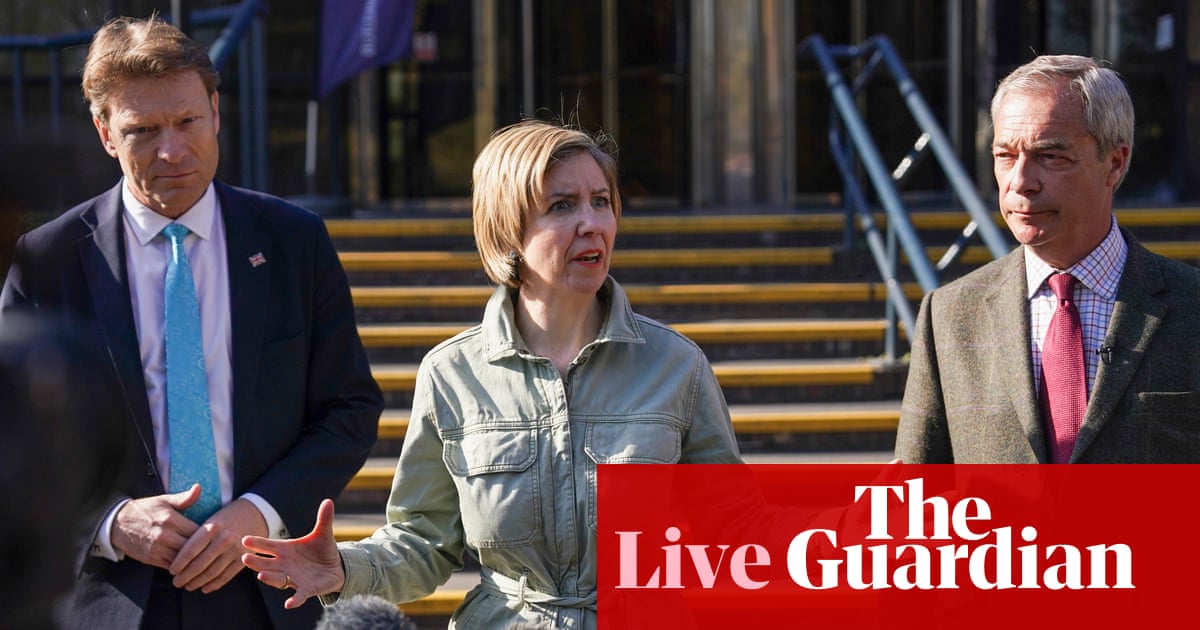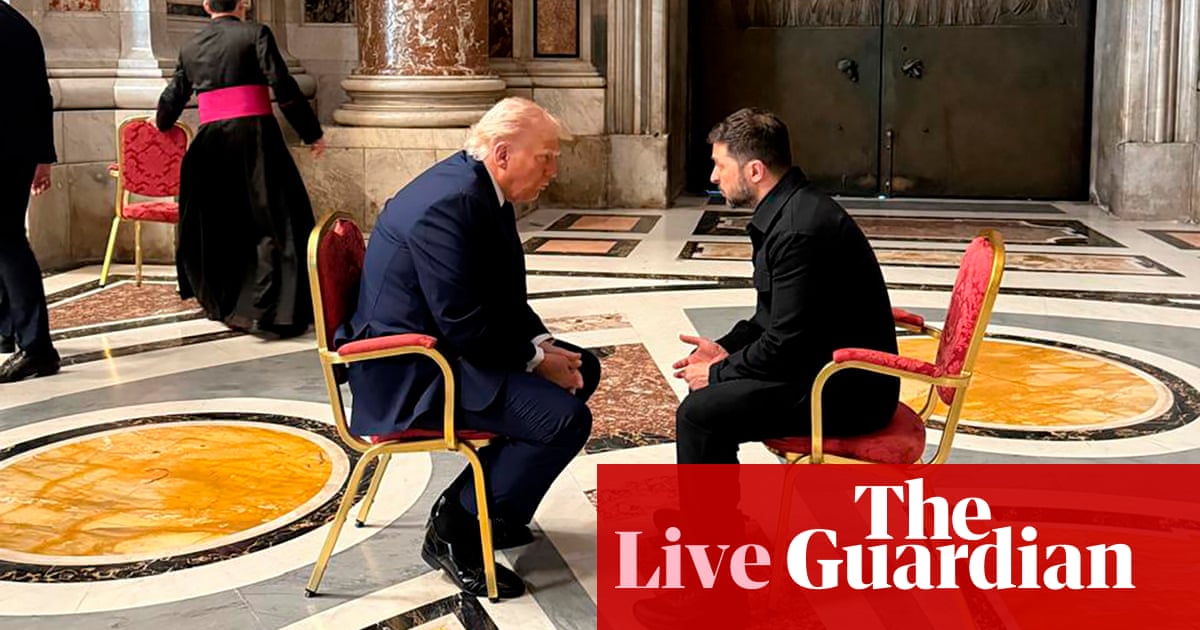Reform UK on course for clear wins in Greater Lincolnshire and Hull/East Yorkshire mayoral contests, poll suggests
There are six mayoral elections next week. Two of them are for single-authority mayors (Doncaster and North Tyneside), but the others are for combined-authority mayors (or regional mayors – like metro mayors, but not just covering city regions). Today YouGov has released polling covering all four of these contests and it suggests Reform UK is on course to win two of them easily. And the Green party is narrowly ahead in a third, the poll suggests.
Here are the polling figures.
Greater Lincolnshire – Reform UK ahead by 15 points

Andrea Jenkyns, the former Tory MP, is the Reform UK candidate here, and this is where Nigel Farage’s party was thought to have its best chance of a mayoral win. Sam Freedman has a good summary of the contest in his invaluable local elections preview on his Substack blog.
In theory the Tories should be winning in Lincolnshire as they hold most of the parliamentary seats in the area and have dominated local politics forever. But it’s also the most Reform-friendly part of the country. It contains Richard Tice’s constituency and numerous seats in which they came second. Plus their candidate is a former Tory MP – Andrea Jenkyns, famous for her Boris Johnson obsession and making a middle finger gesture at a crowd outside Downing Street. She is, by all accounts, quite a few sandwiches short of a picnic but, nevertheless, is strong favourite to win. Large chunks of local Conservative parties, including several councillors, have already defected.
Hull and East Yorkshire – Reform UK ahead by 14 points

Like Greater Lincolnshire, this is a new combined authority, meaning there have not been elections for this mayoral post in the past. Again it was seen as a Reform UK target, but the polling suggests Luke Campbell, a former Olympic boxer, is on course to win easily.
West of England – Green party ahead by four points

It sounds as if the West of England mayor should be in charge of a quarter of the country, but in fact this mayoralty just covers authorities in Bristol, South Gloucestershire and North East Somerset. Labour won it last time, but the outgoing mayor has been arrested over rape and child abuse allegations. The Greens are strong in Bristol, where Carla Denyer, the co-leader, is an MP, and a victory in the mayoral contest would be a signficant breakthrough for the party.
Cambridgeshire and Peterborough – Conservatives ahead by 12 points

When this post was last contested, the Conservative candidate was ahead after the first ballot but the Labour candidate was elected because the other voters were redistributed and the Lib Dem votes carried him over the line in the second round. The Conservatives then scrapped this voting system (the supplementary vote) for mayoral elections and replaced it with first-past-the-post. There are some Labour MPs who would would like the government to revert to the supplementary vote. But, if these YouGov figures are right, even the supplementary vote would not necessarily secure Labour victory here, because the combined Tory/Reform UK vote is larger than the combined Labour/Lib Dem/Green vote.
Key events
Afternoon summary
-
Downing Street has said it wants to move on from “the debates and arguments of the past” at a briefing where a spokesperson accepted the UK is talking to the EU about a youth mobility scheme. In the past the government said it had “no plans” to agree such a scheme with the EU, fearful of claims that Brexiters would view it as a return to free movement. (See 3.13pm.)
-
YouGov has published a poll suggesting Reform UK is on course to win the mayoral elections in Greater Lincolnshire and in Hull and East Yorkshire relatively easily. Its poll also suggests the Green party is narrowly ahead in the contest for West of England mayor. (See 12.41pm.)
For a full list of all the stories covered on the blog today, scroll through the timeline at the top of the blog, above the main picture.
Carla Denyer, the Green party’s co-leader, has backed NHS rules to be changed to make it easier for homeless people to get basic eye care. As the Big Issue reports, speaking at an event hosted by the charity Vision Care for Homeless People, she said:
People are being denied something as basic as a pair of glasses. It’s absurd – and completely fixable …
If someone is finally able to speak to a GP, get an eye test, or ask for glasses, they shouldn’t be turned away. These are modest asks. We know how to fix it. We just need the political will.
The charity is calling for homeless people to be eligible for free eye tests and glasses.
SNPs MPs fail in bid to get Commons to vote on bill devolving immigration policy to Scottish parliament
SNP MPs tried, and failed, today to get the Commons to vote for a bill that would devolve control of immigration policy to the Scottish parliament.
Proposing his devolution (immigration) (Scotland) private member’s bill, Stephen Gethins said that migration was a “good thing”, but that “poison” had entered the national debate on this.
Gethins said:
This bill today is a way of offsetting some of the damage that’s been done by a hostile environment, by Brexit – which I’m astonished day and daily that the Scottish Labour party continue to endorse – and let me talk about the Scottish care system, the current UK immigration system.
All of us will benefit from the care system at some point – all of us. And we’ll all have loved ones to have benefited, so I think their voice is a particularly pertinent one.
The current UK immigration system is failing the social care sector in Scotland. The recent rule changes, particularly the ban on dependents which has had a big impact on other sectors as well, and the incompatible increase in the minimum salary threshold, exacerbate existing recruitment challenges and pose significant risks to the sustainability in delivery of the care services.
The bill will go no further through the Commons because it ran out of time, with the second reading debate still carrying on at 2.30pm. An SNP bid to force a second reading vote was defeated by 50 votes to 12.
Starmer faces Labour revolt over plan to raid bank accounts of benefit claimants
Keir Starmer is facing a rebellion over his plan to use direct deductions from people’s bank accounts and the cancellation of driving licences as part of a government crackdown on welfare fraud and over-claiming, Daniel Boffey reports.
No 10 says it wants to move on from ‘arguments of the past’ as it does not deny talking to EU about youth mobility scheme
At the Downing Street lobby briefing the No 10 spokesperson was also asked about the proposals for some sort of youth mobility scheme with the EU. In particular, he was asked why Nick Thomas-Symonds, the Cabinet Office minister, was telling MPs that there were “no plans” for such a scheme yesterday (see 9.20am), when the German ambassador told the Today programme this morning that he was optimistic about one being agreed (see 10.07am).
The spokesperson said he would not give a running commentary on negotiations that are taking place. But he did not repeat the line about the government having “no plans” for a youth mobility scheme.
He also said:
Both sides are discussing a wide range of issues, which is entirely normal for any negotiation.
I don’t think we could have been clearer that this is not about returning to the EU, but we will not be defined by the debates and arguments of the past.
What we will be defined by is putting more money in the pockets of working people and providing Britain with long-term stability and security.
The line about the “arguments of the past” could be read as meaning Keir Starmer does not want talks about the youth mobility scheme to be paralysed by concerns about whether or not it would amount to “free movement” (which of course it wouldn’t).
Asked if the government would be happy to return to what in practice would be a youth mobility scheme, just so long as it was called something different, the spokesperson just repeated the point about not wanting to be drawn on the details of the discussions.
The Liberal Democrats are a bit more enthusiastic than No 10 about endorsing what Rachel Reeves told the BBC about the UK’s trading relationship with the EU. (See 2.47pm.) But they want the government to go further. This is from Daisy Cooper, the Lib Dem deputy leader and Treasury spokesperson.
The chancellor is absolutely right that our trading relationship with Europe is more important, but the government’s approach so far shows these are little more than empty words.
This government has bent over backwards to appease Donald Trump but barely lifted a finger to unleash growth by boosting trade with Europe.
It’s time for the government to get serious about our trading relationship with Europe by ripping up the red tape from the botched Brexit deal, agreeing a capped youth mobility scheme and negotiating a UK-EU customs union. That is the way we can finally generate the growth needed to rebuild our public services and protect family finances.
No 10 restates Starmer’s claim that favouring either EU or US would be ‘false choice’
At the Downing Street lobby briefing the No 10 spokesperson was asked about Rachel Reeves’s comment about the UK’s trading relationship with the EU being “arguably even more important” than its trading relationship with the the US. (See 9.20am.) The Telegraph’s live blog is currently headlining on No 10 “refusing to back” Reeves’ claim about the EU being more important than the US. That is certainly one interpretation, but the PM’s spokesperson did say Reeves was just making a statement of fact.
He also restated Keir Starmer’s argument about choosing between the EU and the US being a “false choice”.
This is how the exchanges at the briefing started. They give some indication of why No 10 is always nervous of saying anything that will sound like ‘Brexit betrayal’.
Q: Does the PM agree with Rachel Reeves that Britain’s relationship with the EU is more important than with the US? In response, the No 10 spokesperson said that it was a statement of fact that the EU was our largest trading, but that the PM thought having to choose between the EU and the US was a “false choice”.
Q: Why would Reeves say that just before meeting the US treasury secretary? The No 10 spokesperson said it was a statement of fact. He repeated the point about the ‘“false choice”.
Q: So was Reeves wrong to say the EU was more important? The No 10 spokesperson said that was not what he said. The fact that the EU was the UK’s largest trading partner was “a matter of public record”, he said. The EU and the US were both important, he said.
Q: Was this expectations management, because you know you will not get what you want from the US? No, said the No 10 spokesperson. He said the talks with the US were continuing.
The Sun newspaper is currently running a “Don’t Betray Brexit” campaign, and the Daily Express, the Daily Mail and the Daily Telegraph broadly take a similar view. It a brave issue to campaign on, given that only 11% of people think Brexit has been a success, but I suppose at the Guardian we should not be lecturing anyone else on adopting unfashionable causes.
These are from Ben Walker, a Britain Elects co-founder and data journalist at the New Statesman, on social media on the YouGov polling for the Greater Lincolnshire mayoral contest. (See 12.41pm.) He thinks Reform UK supporters are much more motivated to vote than anyone else.
1) wow, 2) likely some impressive differential turnout. Reform voters are psyched up. The rest… aren’t.
On these votes that’d be control of Lincolnshire county council too.
No 10 says ‘all options remain on table’ amid reports PM backing off plans to send troops to Ukraine as part of peace deal
Keir Starmer is likely to abandon plans to send British troops to Ukaine as part of a “coalition of the willing” force to protect the country in the event of potential peace deal, the Times says today. In her story, Larissa Brown says:
Britain is likely to abandon plans to send thousands of troops to protect Ukraine because the risks are deemed “too high”, it can be revealed.
In an apparent softening of plans, Britain and Europe would no longer have a ground force guarding key cities, ports and nuclear power plants to secure the peace …
A source involved in discussions about a “coalition of the willing” said of plans for a force of tens of thousands of ground troops: “The risks are too high and the forces inadequate for such a task. This was always the UK’s thought. It was France who wanted a more muscular approach.”
At the Downing Street lobby briefing, asked if the PM was rowing back on his pledge to put British troops on the ground in the Ukraine, a No 10 spokesperson said he did not “recognise” the Times report. “All options remain on the table,” he said.
Asked whether troops being deployed would be dependent on the US offering a “backstop” to a peace deal, the spokesperson he said he would not give a running commentary on talks. He added:
As the prime minister has said in recent days, we’re working closely with the US. We’re all focussed on ending the bloodshed and securing a lasting peace for Ukraine.
Former TV executive David Kogan confirmed as chair of Independent Football Regulator
The Department for Culture, Media and Sport has now confirmed that the TV executive David Kogan is its preferred candidate to be chair of the new Independent Football Regulator. As Jacob Steinberg reports, Kogan, who has had a series of senior posts in the media and sports, has also donated to Labour candidates, and was chair of the LabourList website.
The Conservative party has dismissed him as a Labour “crony”. Louie French, the shadow sports minister, said:
This deeply political appointment calls into question the regulator’s ability to operate with the impartiality fans deserve. It’s yet another example of a Labour government more interested in rewarding its donors than serving the public interest.
LabourList is looking for a replacement.










